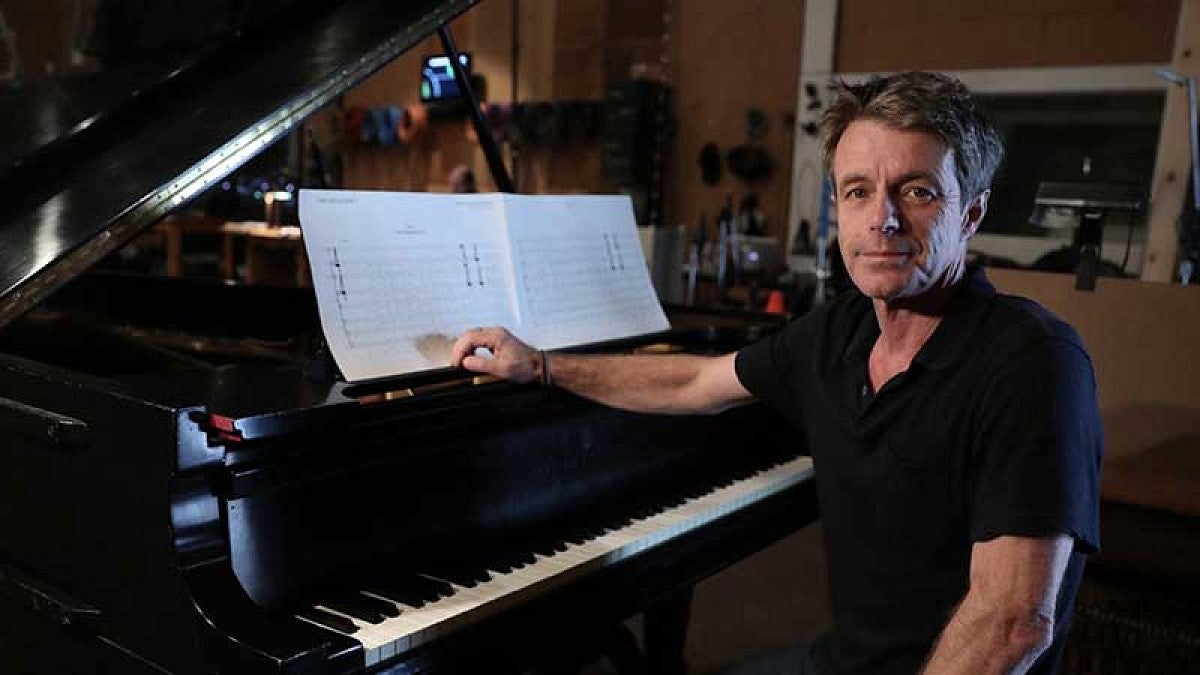Working remotely is still something new for many people these days, but film composer Harry Gregson-Williams has been creating soundtracks for hit Hollywood movies from his home studio in Los Angeles for years.
“I did most of (Ridley Scott’s Oscar-nominated film) ‘The Martian’ at my home studio in the middle of the night,” Gregson-Williams said.
The University of Oregon community will get a rare, behind-the-scenes tour of his high-tech studio Thursday, April 16, at 7 p.m., as part of a live-streamed multimedia presentation, where Gregson-Williams will explain and demonstrate the musical elements behind his well-known film scores, including “Shrek,” “The Equalizer,” “The Equalizer 2” and “The Martian,” as well as the music behind popular video games “Call of Duty” and “Metal Gear Solid.”
Gregson-Williams, who has two children enrolled at the UO, often conducts his film scores in front of a full orchestra at the famed Abbey Road Studios in London, but his compositions usually start out as a simple improvisation at the piano he bought after moving to Los Angeles to pursue a film career more than 20 years ago.
He then feeds the recording through colorful cables to the myriad electronic devices that line the walls of his studio, to make it sound fleshed out and in some cases sound like a full symphony orchestra.
But students don’t need a fully-equipped studio to start out on the road to becoming a successful film composer. The most important attributes are passion, a love of music and an understanding of technology, Gregson-Williams said.
“The idea is to be able to have the imagination to create music that can bring another dimension to a film, and there’s a lot of technology around that helps one do that,” Gregson-Williams said. “There’s room for many, many shapes and sizes of creativity in this field, because, particularly today, there’s music just about everywhere, on every app you open, on every streaming TV show.”
Gregson-Williams’ presentation can only be viewed live and will not be available online afterwards, so log on at 7 p.m. Thursday, April 16, to participate or miss out.
“We’re honored to have one of Hollywood’s top film composers offer this opportunity for our students and the entire UO community to learn from one of the masters of the craft,” said Sabrina Madison-Cannon, dean of the School of Music and Dance. “This is exactly the kind of innovative, remote learning experience that we’re dedicated to providing to our students, as we continue their education online during this time of COVID-19.”
Gregson-Williams is the father of a pair of Ducks. His son Josh is currently a sophomore majoring in psychology, and his daughter Jessie is a junior studying psychology and law.
The virtual event is a collaboration between the School of Music and Dance and the newly formed Digital Engagement Task Force, which is a joint project between University Advancement and the UO Alumni Association.
“We had originally invited Harry to come to campus to present this event as part of our ongoing professional development series, but we were thrilled when he offered to do it virtually,” said Grace Ho, professional development and academic advisor at the School of Music and Dance.
Ho said she hoped to bring Gregson-Williams back to give an in-person lecture at the university sometime after COVID-19 travel restrictions and health advisories had been lifted.
The Digital Engagement Task Force’s goal is to present at least one virtual event for the UO community each week.
“It’s important to keep our community connected during this time, so we’ve created this series of virtual events,” said task force organizer Michelle Joyce, director of regional engagement at University Development. “We have a variety of free online events in store, featuring faculty, alumni and friends of the university.”
The online learning event “Science Communication in the Time of COVID-19” on April 8 has already been assigned as “required viewing” for some students at the School of Journalism and Communication.
Upcoming events include: “Up Your LinkedInGame” April 15; “The Secret Chemistry of Beer” April 23 with Jim Hutchison, senior associate vice president of the Phil and Penny Knight Campus for Accelerating Scientific Impact and Lokey-Harrington Chair in the Department of Chemistry and Biochemistry; “A Story of Resilience: A Family History of Surviving the Holocaust” April 28 from UO alum Rob Aigner; and “COVID-19 and The Law” May 6 with faculty members Elizabeth Tippett, Greg Dotson and Latisha Nixon-Jones.
Gregson-Williams has generously offered to donate his honorarium to help students at the School of Music and Dance.
To support UO students who are experiencing difficulties due to COVID-19, consider a contribution to the Students in Crisis Fund.
—By Steve Fyffe, School of Music and Dance


